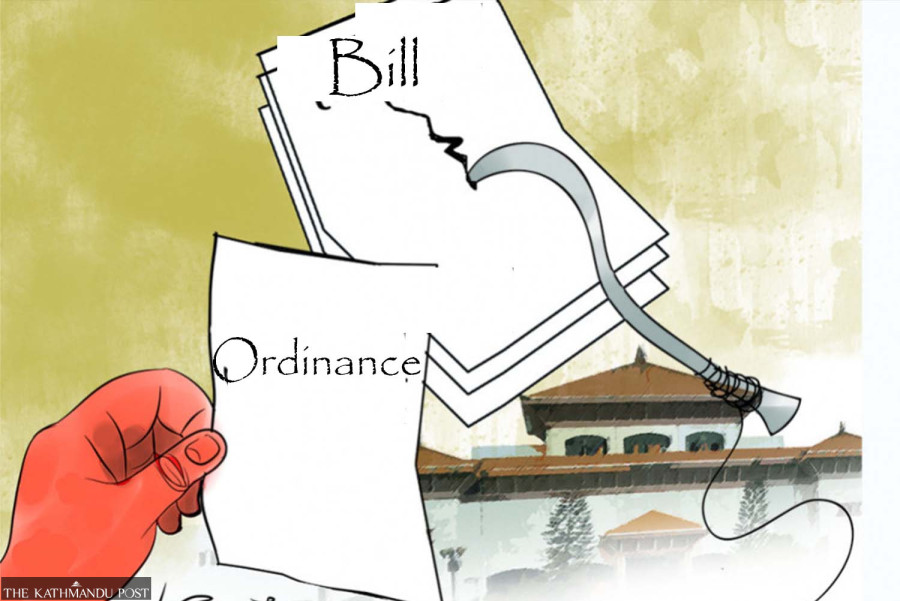Politics
UML stands firmly behind ordinances, Congress is divided
Opposition to chide government in House for ordinances.
Anil Giri
As debate continues over whether issuing ordinances in the absence of a Parliament session is justified, the government’s recent enactment of five ordinances has split the ruling parties.
President Ramchandra Paudel, on the recommendation of the government, recently authenticated five ordinances aimed at bringing reforms in the government, fostering a business-friendly environment, attracting foreign investment, and promoting the information and technology sectors.
But the government’s move to use ordinances has created uproar in different sections. The issue has particularly divided the Nepali Congress, the largest party and key ruling partner, but the CPN-UML appears unified in defending the government’s move.
Also, opposition parties, mainly the CPN (Maoist Centre), are planning to strongly raise the issue of ordinances at the upcoming Parliament session, which is set to begin on January 31.
Several Congress leaders, mostly from the dissident Shekhar Koirala faction, have been expressing reservations about the government’s decision to bring ordinances. Koirala leads a camp that is often seen as being directed against party president Sher Bahadur Deuba. Deuba and Koirala had contested party presidency in December 2021, and Deuba had won.
Besides Koirala, several other leaders of this camp, like Arjun Nar Singh KC, NP Saud and others have stood against the ordinances. However, two general secretaries—Gagan Thapa and Bishwa Prakash Sharma—have supported the government’s decision. Thapa, who contested for party general secretary from the Koirala camp in 2021 and won, is of late inching closer to Deuba. Thapa reportedly played a pivotal role in bringing the ordinances.
Speaking at a function in Biratnagar on Wednesday, Koirala criticised the decision while questioning the urgency of issuing the ordinances while the parliament is in recess.
“The winter session of the House of Representatives is set for January 31, so what was the urgency to bypass parliament and issue the ordinances?” he said.
“The ruling parties have nearly two-thirds majority [in the House of Representatives] and there is no problem in passing any bill,” said Koirala.
But some ministers as well as some Congress and UML leaders argue that it takes months to get bills approved from the House, so the government decided to bring ordinances as it wants to take some immediate action on some urgent issues.
“If issuing an ordinance is wrong, then why do we have a provision for ordinance in the constitution?” said UML Secretary Yogesh Bhattarai.
On the other hand, Koirala argues that the constitutional provision for ordinances is being misused by the government.
He said ordinances are meant to address national crises and remove obstacles in difficult times, but the current situation does not warrant such drastic measures.
“The two largest parties, the Congress and the UML, are in the government, which is considered as a strong one. At a time when there is a strong government, why is there a need to bring ordinances? They [NC and UML] can easily pass any bill through a majority vote,” said Koirala. “This makes me question: Are we heading towards totalitarianism?”
On Wednesday itself, the UML, another ruling party, convened a meeting of the ministers representing the party as well as its lawmakers. The meet was aimed at defending the ordinances.
Some experts were also invited in the interaction where they explained the intricacies of the five ordinances. Before introducing the ordinances to amend some acts and laws, the government had formed a task force headed by former chief secretary Liladevi Gadtaula to recommend changes.
As per the suggestions of the task force, the government introduced the five different ordinances to create a business-friendly environment, attract foreign investment, and to promote information technology and good governance, among other things. Several private sector organisations have welcomed the ordinances.
The interaction-cum-training aimed to familiarise lawmakers with the content of the ordinances and prepare them to defend the government’s move in the upcoming parliament session, said UML Chief Whip Mahesh Bartuala.
“The ordinances are meant to facilitate the country's economic prosperity and public service delivery. But the opposition parties have been criticising the government under the pretext of opposing the ordinances.”
Bartaula said the ordinances, which were introduced within the bounds of constitutional framework, will be presented in the House on January 31, and the government has been advised to proceed systematically through replacement bills.
Other UML leaders have also defended the ordinances. “The lawmakers should know the nitty-gritty of the ordinances and communicate their importance to the general people,” Bartaula said.




 18.12°C Kathmandu
18.12°C Kathmandu















